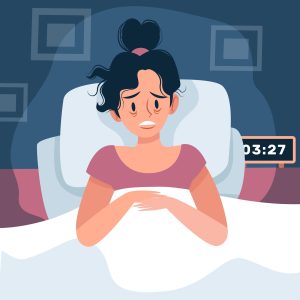What is Insomnia?
 So, what is insomnia? insomnia is defined as the inability to fall asleep stay asleep or have non-restorative sleep. it’s a pervasive disorder seen in our population affecting about 58% of Americans at one time or another. it can also be a sign or a symptom of another disorder medical disorder such as diabetes thyroid disorders benign prostate hypertrophy or mental disorders. such as anxiety and depression so insomnia can be classified into two different types insomnia
So, what is insomnia? insomnia is defined as the inability to fall asleep stay asleep or have non-restorative sleep. it’s a pervasive disorder seen in our population affecting about 58% of Americans at one time or another. it can also be a sign or a symptom of another disorder medical disorder such as diabetes thyroid disorders benign prostate hypertrophy or mental disorders. such as anxiety and depression so insomnia can be classified into two different types insomnia
1. ACUTE INSOMNIA
acute insomnia is when you have a known triggering factor and your insomnia lasts for less than a month when your insomnia lasts for more than a month it’s then called chronic insomnia chronic insomnia can be further classified into adjustment insomnia which is there’s a known triggering factor it’s lasting a little bit longer than one month cycle physiologic insomnia where the person is left with behaviors or sleep habits that further perpetuate their insomnia.
paradoxical insomnia is when a person may be sleeping a lot more than they think insomnia due to mental disorders which are usually anxiety or depression and insomnia due to medical disorders such as diabetes thyroid problems, and hypertension you can also have insomnia due to inadequate sleep hygiene many people don’t practice good sleep habits and that will lead to insomnia at night.
2. Chronic insomnia
chronic insomnia can also be called primary insomnia versus secondary insomnia primary insomnia is when you cannot trace your insomnia back to any definitive cause secondary insomnia is when you have a direct cause such as a medical disorder or mental disorder leading to insomnia so those are the different types of insomnia an extensive history is needed to determine what type is of insomnia that you may have.
Cure Insomnia Fast | 10 tips
I have been trying these tips for 3 weeks trust me now I have solved my sleep problem 70% now I believe I will solve this 100% in 2 or 3 months.
- 1st tip is to Wake up at the same time each day. It is tempting to sleep late on weekends, especially if you have had poor sleep during the week.
However, if you suffer from insomnia you should get up at the same time every day to train your body to wake at a consistent time. - 2nd tip we recommend to Eliminate alcohol and stimulants like nicotine and caffeine. The effects of caffeine can last for several hours, perhaps up to 24 hours, so the chances of it affecting sleep are significant. Caffeine may not only cause difficulty initiating sleep but may also cause frequent awakenings.
Alcohol may have a sedative effect for the first few hours following consumption, but it can then lead to frequent arousal and a non-restful night’s sleep.
If you are on medications that act as stimulants, such as decongestants or asthma inhalers, ask your doctor when they should best be taken to help minimize any effect on sleep. - 3rd tip we recommend to Limit naps. While napping seems like a proper way to catch up on missed sleep, it is not always so.
It is important to establish and maintain a regular sleep pattern and train oneself to associate sleep with cues like darkness and a consistent bedtime. Napping can affect the quality of nighttime sleep. - 4th we recommend exercising regularly. Regular exercise can improve sleep quality and duration. However, exercising immediately before bedtime can have a stimulant effect on the body and should be avoided. Try to finish exercising at least three hours before you plan to retire for the night.
- 5th we recommend limiting activities in bed. The bed is for sleeping and that’s it. If you suffer from insomnia, do not balance the checkbook, study, or make phone calls, for example, while in bed or even in the bedroom, and avoid watching television or listening to the radio. All these activities can increase alertness and make it difficult to fall asleep.
- 6th we recommend not eating or drinking right before going to bed. Eating a late dinner or snacking before going to bed can activate the digestive system and keep you up. If you suffer from gastroesophageal reflux (GERD) or heartburn, it is even more important to avoid eating and drinking right before bed since this can make your symptoms worse. In addition, drinking a lot of fluids before bed can overwhelm the bladder, requiring frequent visits to the bathroom that disturb your sleep.
- 7th we recommend making your sleeping environment comfortable. Temperature, lighting, and noise should be controlled to make the bedroom conducive to falling (and staying) asleep. Your bed should feel comfortable and if you have a pet that sleeps in the room with you, consider having the pet sleep somewhere else if it tends to make noise in the night.
- 8th we recommend getting all your worrying over with before you go to bed.
If you find yourself lying in bed thinking about tomorrow, consider setting aside a time — perhaps after dinner — to review the day and make plans for the next day. The goal is to avoid doing these things while trying to fall asleep. It is also useful to make a list of, say, work-related tasks for the next day before leaving work. That, at least, eliminates one set of concerns. - 9th we recommend reducing stress. There are many relaxation therapies and stress reduction methods you may want to try to relax the mind and the body before going to bed. Examples include progressive muscle relaxation (perhaps with audio tapes), deep breathing techniques, imagery, meditation, and biofeedback.
- 10th tip we recommend to Consider participating in cognitive therapy. Cognitive therapy helps some people with insomnia identify and correct inappropriate thoughts and beliefs that may contribute to insomnia. In addition, cognitive therapy can give you the proper information about sleep norms, and age-related sleep changes, and help set reasonable sleep goals, among other things. So that sums up our top 10 tips for curing insomnia
